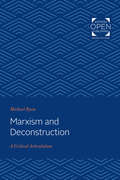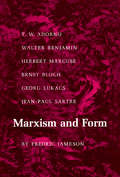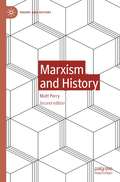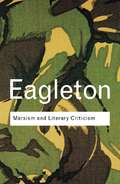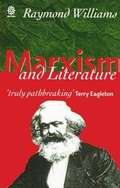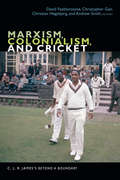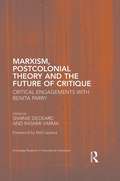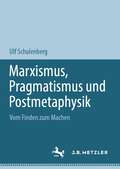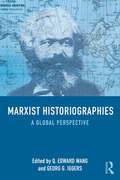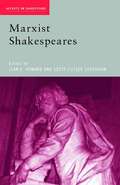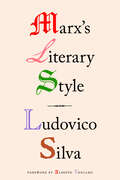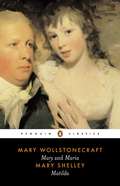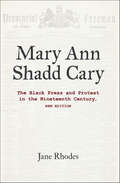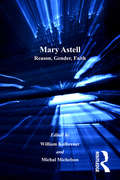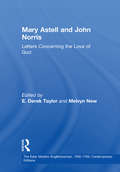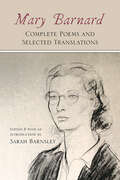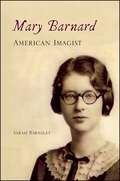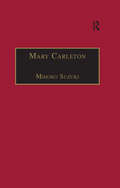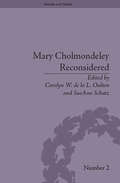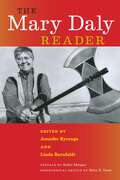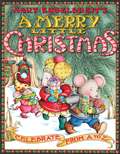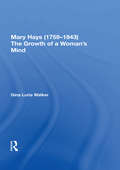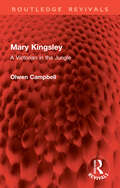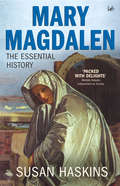- Table View
- List View
Marxism and Deconstruction: A Critical Articulation
by Michael RyanOriginally published in 1982. Aside from Jacques Derrida's own references to the "possible articulation" between deconstruction and Marxism, the relationship between the two has remained largely unexplored. In Marxism and Deconstruction, Michael Ryan examines that multifaceted relationship but not through a mere comparison of two distinct and inviolable entities. Instead, he looks at both with an eye to identifying their common elements and reweaving them into a new theory of political practice. To accomplish his task, Ryan undertakes a detailed comparison of deconstruction and Marxism, relating deconstruction to the dialectical tradition in philosophy and demonstrating how deconstruction can be used in the critique of ideology. He is a forceful critic of both the politics of deconstruction and the metaphysical aspect of Marxism (as seen from a deconstructionist perspective). Besides offering the first book-length study of Derrida in this context, Ryan makes the first methodic attempt by an American scholar to apply deconstruction to domains beyond literature. He proposes a deconstructive Marxism, one lacking the metaphysical underpinnings of conservative "scientific" Marxist theory and employing deconstructive analysis both for Marxist political criticism and to further current anti-metaphysical developments within Marxism. Marxism and Deconstruction is an innovative and controversial contribution to the fields of literary criticism, philosophy, and political science.
Marxism and Form: 20th-Century Dialectical Theories of Literature
by Fredric JamesonFor more than thirty years, Fredric Jameson has been one of the most productive, wide-ranging, and distinctive literary theorists in the United States and the Anglophone world. Marxism and Form provided a pioneering account of the work of the major European Marxist theorists--T. W. Adorno, Walter Benjamin, Herbert Marcuse, Ernst Bloch, Georg Lukács, and Jean-Paul Sartre--work that was, at the time, largely neglected in the English-speaking world. Through penetrating readings of each theorist, Jameson developed a critical mode of engagement that has had tremendous in.uence. He provided a framework for analyzing the connection between art and the historical circumstances of its making--in particular, how cultural artifacts distort, repress, or transform their circumstances through the abstractions of aesthetic form. Jameson's presentation of the critical thought of this Hegelian Marxism provided a stark alternative to the Anglo-American tradition of empiricism and humanism. It would later provide a compelling alternative to poststructuralism and deconstruction as they became dominant methodologies in aesthetic criticism. One year after Marxism and Form, Princeton published Jameson's The Prison-House of Language (1972), which provided a thorough historical and philosophical description of formalism and structuralism. Both books remain central to Jameson's main intellectual legacy: describing and extending a tradition of Western Marxism in cultural theory and literary interpretation.
Marxism and History (Theory and History)
by Matt PerryThis textbook examines Marxism’s enormous impact on the way historians approach their subject. Tackling current historiographical questions in an accessible way, the author offers a clear introduction to Marxist views of history, key Marxist historians and thinkers, and the relevance of Marxist theory and history to students’ own work. This is a concise, thorough overview of an important area of historiography. The second edition incorporates significant new developments in research, including Marxist contributions to the emergence of global, maritime and transnational history; the discovery of Marx’s ecologism and the historical critique of fossil capitalism as a source of environmental disaster; a reassessment of gender oppression through social reproduction theory; and the contribution of Marxism to debates on race, Eurocentrism and whiteness.
Marxism and Literary Criticism
by Terry EagletonIs Marx relevant any more? Why should we care what he wrote? What difference could it make to our reading of literature? Terry Eagleton, one of the foremost critics of our generation, has some answers in this wonderfully clear and readable analysis. Sharp and concise, it is, without doubt, the most important work on literary criticism that has emerged out of the tradition of Marxist philosophy and social theory since the nineteenth century.
Marxism And Literature
by Raymond WilliamsThis book extends the theme of Raymond Williams's earlier work in literary and cultural analysis. He analyses previous contributions to a Marxist theory of literature from Marx himself to Lukacs, Althusser, and Goldmann, and develops his own approach by outlining a theory of `cultural materialism' which integrates Marxist theories of language with Marxist theories of literature. Williams moves from a review of the growth of the concepts of literature and idealogy to a redefinition of `determinism' and `hegemony'. His incisive discussion of the 'social material process' of cultural activity culminates in a re-examination of the problems of alignment and commitment and of the creative practice in individual authors and wider social groups.
Marxism and Problems of Linguistics
by Joseph StalinThis book focused against dogmatism in Marxist thought on language, but it also presents irrefutable arguments against idealist, naturalist and formalist thinking on language as well as clarifying the Marxist approach and method on basic questions of linguistics.
Marxism, Colonialism, and Cricket: C. L. R. James's Beyond a Boundary (The C. L. R. James Archives)
by David Featherstone Christopher Gair Christian Høgsbjerg Andrew SmithWidely regarded as one of the most important and influential sports books of all time, C. L. R. James's Beyond a Boundary is—among other things—a pioneering study of popular culture, an analysis of resistance to empire and racism, and a personal reflection on the history of colonialism and its effects in the Caribbean. More than fifty years after the publication of James's classic text, the contributors to Marxism, Colonialism, and Cricket investigate Beyond a Boundary's production and reception and its implication for debates about sports, gender, aesthetics, race, popular culture, politics, imperialism, and English and Caribbean identity. Including a previously unseen first draft of Beyond a Boundary's conclusion alongside contributions from James's key collaborator Selma James and from Michael Brearley, former captain of the English Test cricket team, Marxism, Colonialism, and Cricket provides a thorough and nuanced examination of James's groundbreaking work and its lasting impact. Contributors. Anima Adjepong, David Austin, Hilary McD. Beckles, Michael Brearley, Selwyn R. Cudjoe, David Featherstone, Christopher Gair, Paget Henry, Christian Høgsbjerg, C. L. R. James, Selma James, Roy McCree, Minkah Makalani, Clem Seecharan, Andrew Smith, Neil Washbourne, Claire Westall
Marxism, Postcolonial Theory, and the Future of Critique: Critical Engagements with Benita Parry (Routledge Research in Postcolonial Literatures)
by Sharae Deckard Rashmi VarmaUsing the aesthetic and political concerns of Parry’s oeuvre as a touchstone, this book explores new directions for postcolonial studies, Marxist literary criticism, and world literature in the contemporary moment, seeking to re-imagine the field, and alongside it, new possibilities for left critique. It is the first volume of essays focusing on the field-defining intellectual legacy of the literary scholar Benita Parry. As a leading critic of the post-structuralist turn within postcolonial studies, Parry has not only brought Marxism and postcolonial theory into a productive, albeit tense, dialogue, but has reinvigorated the field by bringing critical questions of resistance and struggle to bear on aesthetic forms. The book’s aim is two-fold: first, to evaluate Parry’s formative influence within postcolonial studies and its interface with Marxist literary criticism, and second, to explore new terrains of scholarship opened up by Parry’s work. It provides a critical overview of Parry’s key interventions, such as her contributions to colonial discourse theory; her debate with Spivak on subaltern consciousness and representation; her critique of post-apartheid reconciliation and neoliberalism in South Africa; her materialist critique of writers such as Kipling, Conrad, and Salih; her work on liberation theory, resistance, and radical agency; as well as more recent work on the aesthetics of "peripheral modernity." The volume contains cutting-edge work on peripheral aesthetics, the world-literary system, critiques of global capitalism and capitalist modernity, and the resurgence of Marxism, communism, and liberation theory by a range of established and new scholars who represent a dissident and new school of thought within postcolonial studies more generally. It concludes with the first-ever detailed interview with Benita Parry about her activism, political commitments, and her life and work as a scholar.
Marxismus, Pragmatismus und Postmetaphysik: Vom Finden zum Machen
by Ulf SchulenbergVom Finden zum Machen bietet die erste ausführliche Diskussion über die Beziehung zwischen Marxismus und Pragmatismus. Diese beiden Philosophien der Praxis sind nicht unvereinbar, und eine Analyse ihrer Beziehung hilft, beide besser zu verstehen. Im Rahmen eines transatlantischen theoretischen Dialogs werden in diesem Buch Gemeinsamkeiten und Unterschiede zwischen diesen Philosophien erörtert. Es handelt sich um eine interdisziplinäre Studie, die Philosophie, amerikanische und europäische Geistesgeschichte und Literaturwissenschaft zusammenführt. Schulenbergs Buch zeigt, dass der Versuch, die Dialektik von Marxismus und Pragmatismus zu erhellen, ein guter Ausgangspunkt ist, wenn wir das unvollendete Projekt der Etablierung einer wirklich postmetaphysischen Kultur weiterführen wollen. Das Buch bietet detaillierte Diskussionen über Sidney Hook, Georg Lukács, Theodor W. Adorno, Fredric Jameson, W.E.B. Du Bois, John Dewey, Richard Rorty und Jacques Rancière.Die Übersetzung wurde mit Hilfe von künstlicher Intelligenz durchgeführt. Eine anschließende menschliche Überarbeitung erfolgte vor allem in Bezug auf den Inhalt.
Marxist Historiographies: A Global Perspective
by Q. Edward Wang Georg G. IggersMarxist Historiographies is the first book to examine the ebb and flow of Marxist historiography from a global and cross-cultural perspective. Since the eighteenth century, few schools of historical thought have exerted a more lasting impact than Marxism, and this impact extends far beyond the Western world within which it is most commonly analysed. Edited by two highly respected authors in the field, this book deals with the effect of Marxism on historical writings not only in parts of Europe, where it originated, but also in countries and regions in Africa, Asia, North and South America and the Middle East. Rather than presenting the chapters geographically, it is structured with respect to how Marxist influence was shown in the works of historians in a particular area. This title takes a dual approach to the subject; some chapters are national in scope, addressing the Marxist impact on historical practices within a country, whereas others deal with the varied expressions of Marxist historiography throughout a wider region. Taking a truly global perspective on this topic, Marxist Historiographies demonstrates clearly the breadth and depth of Marxism’s influence in historical writing throughout the world and is essential reading for all students of historiography.
Marxist Shakespeares (Accents on Shakespeare)
by Jean E. HowardMarxist Shakespeares uses the rich analytic resources of the Marxist tradition to look at Shakespeare's plays afresh. The book offers new insights into the historical conditions within which Shakespeare's representations of class and gender emerged, and into Shakespeare's role in the global culture industry stretching from Hollywood to the Globe Theatre. A vital resource for students of Shakespeare which includes Marx's own readings of Shakespeare, Derrida on Marx, and also Bourdieu, Bataillle, Negri and Alice Clark.
Marx's Literary Style
by Ludovico SilvaMarx&’s Literary Style argues that a true understanding of Marx&’s work requires a careful study of his literary choicesIn Marx&’s Literary Style, the Venezuelan poet and philosopher Ludovico Silva argues that much of the confusion around Marx&’s work results from a failure to understand his literary mode of expression. Through meticulous readings of key passages in Marx&’s oeuvre, Silva isolates the key elements of his style: his search for an &“architectonic&” unity at the level of the text, his capacity to express himself dialectically at the level of the sentence, and, above all, his great gift for metaphor. Silva&’s unique sensitivity to Marx&’s literary choices allows him to illuminate a number of terms that have been persistently, and fatefully, misunderstood by many of Marx&’s most influential readers, including alienation, reflection, and base and superstructure. At the heart of Silva&’s book is his contention that we we cannot hope to understand Marx if we treat him as a scientist, a philosopher, or a literary writer, when he was in fact all three at once.Originally published in 1971, this is a key work by one of the most important Latin American Marxists of the twentieth century. This edition, which marks the first appearance of one of Silva&’s works in English, features an introduction by Alberto Toscano.
Mary and Maria, Matilda
by Mary Wollstonecraft Mary ShelleyThese three works of fiction - two by Mary Wollstonecraft, the radical author of A Vindication of the Rights of Woman, and one by her daughter Mary Shelley, creator of Frankenstein - are powerfully emotive stories that combine passion with forceful feminist argument. In Mary Wollstonecraft's Mary, the heroine flees her young husband in order to nurse her dearest friend, Ann, and finds genuine love, while Maria tells of a desperate young woman who seeks consolation in the arms of another man after the loss of her child. And Mary Shelley's Matilda - suppressed for over a century - tells the story of a woman alienated from society by the incestuous passion of her father. Humane, compassionate and highly controversial, these stories demonstrate the strongly original genius of their authors.
Mary Ann Shadd Cary: The Black Press and Protest in the Nineteenth Century
by Jane RhodesMary Ann Shadd Cary was a courageous and outspoken nineteenth-century African American who used the press and public speaking to fight slavery and oppression in the United States and Canada. Part of the small free black elite who used their education and limited freedoms to fight for the end of slavery and racial oppression, Shadd Cary is best known as the first African American woman to publish and edit a newspaper in North America. But her importance does not stop there. She was an active participant in many of the social and political movements that influenced nineteenth century abolition, black emigration and nationalism, women's rights, and temperance. Mary Ann Shadd Cary: The Black Press and Protest in the Nineteenth Century explores her remarkable life and offers a window on the free black experience, emergent black nationalisms, African American gender ideologies, and the formation of a black public sphere. This new edition contains a new epilogue and new photographs.
Mary Astell: Reason, Gender, Faith
by William KolbrenerMary Astell: Reason, Gender, Faith includes essays from diverse disciplinary perspectives to consider the full range of Astell's political, theological, philosophical, and poetic writings. The volume does not eschew the more traditional scholarly interest in Astell's concerns about gender; rather, it reveals how Astell's works require attention not only for their role in the development of early modern feminism, but also for their interventions on subjects ranging from political authority to educational theory, from individual agency to divine service, and from Cartesian ethics to Lockean epistemology. Given the vast breadth of her writings, her active role within early modern political and theological debates, and the sophisticated complexity of her prose, Astell has few parallels among her contemporaries. Mary Astell: Reason, Gender, Faith bestows upon Astell the attention which she deserves not merely as a proto-feminist, but as a major figure of the early modern period.
Mary Astell and John Norris: Letters Concerning the Love of God (The Early Modern Englishwoman, 1500-1750: Contemporary Editions)
by Melvyn NewGiven the progress made in recent years in recovering the writings of early modern women, one might expect that a complete set of the important works of Mary Astell (1666-1731) would have been reissued long before now. Instead, only portions of the thought of the 'First English Feminist' have reached a wide academic audience. This volume presents a critical and annotated edition of the correspondence between Astell and John Norris of Bemerton (1657-1711), Letters Concerning the Love of God, which was published in three separate editions during the seventeenth and eighteenth centuries (1695, 1705, 1730). This work had profound significance in eighteenth-century intellectual and religious circles, and represents a crucial step in the development of Norris and Astell's philosophical and theological opposition to that most prominent of Enlightenment figures, John Locke. Letters Concerning the Love of God includes, as contextual material, Norris's Cursory Reflections upon a Book Call'd, An Essay Concerning Human Understanding (1690), the first published philosophical response to (as Bishop Stillingfleet would later put it) Locke's 'new way of ideas,' and Astell's biting and comprehensive attack on Locke in the 'Appendix' to the second edition of The Christian Religion, As Professed by a Daughter of the Church of England (1717). These texts serve to place both Letters and its authors in the contentious philosophical-theological climate to which they belonged, one wherein, most significantly, Locke's present-day preeminence had yet to be realized. The editors' extensive introduction and annotations to this volume not only provide background on the historical and biographical elements, but also elucidate philosophical and theological concepts that are perhaps unfamiliar to modern readers.
Mary Barnard: Complete Poems and Selected Translations
by Mary BarnardThe most comprehensive collection of writing by award-winning US poet, renowned translator of Sappho, and trailblazing archivist Mary Barnard.Born in the Pacific Northwest, Mary Barnard (1909–2001) struck up correspondence with Ezra Pound in 1933, won Poetry magazine's prestigious Levinson Award in 1935, and moved to New York City the following year. There she met Marianne Moore and William Carlos Williams, who proclaimed her writing emblematic of "what we have been about all these years." This fully annotated volume makes available Barnard's complete poems for the first time, along with a robust selection of her translations and prose. Most well-known for her bestselling Sappho and her influential role as the inaugural poetry curator at the University at Buffalo, Barnard was a "second-wave" modernist and "late" Imagist whose regionally grounded writing also anticipated later eco-poetry. The volume's editor, Barnard scholar and biographer Sarah Barnsley, situates Barnard's work within these broader literary and cultural currents. Previously unpublished poems appear alongside Barnard's essays on her creative practice and friendships, illuminating the career, oeuvre, and ethos of this pivotal yet still underappreciated twentieth-century figure. With a foreword by Mary de Rachewiltz (author of Ezra Pound, Father and Teacher) and afterword by Barnard's literary executor Elizabeth J. Bell, Mary Barnard is essential reading for poets, scholars, and translators.
Mary Barnard, American Imagist
by Sarah BarnsleyPerhaps best known for her outstanding translation of Sappho, poet Mary Barnard (1909–2001) has until recently received little attention for her own work. In this book, Sarah Barnsley examines Barnard's poetry and poetics in the light of her plentiful correspondence with Ezra Pound, William Carlos Williams, and others. Presenting Barnard as a "late Imagist," Barnsley links Barnard's search for a poetry grounded in native speech to efforts within American modernism for new forms in the American grain. Barnsley finds that where Pound and Williams began the campaign for a modern poetry liberated from the "heave" of the iambic pentameter, Barnard completed it through a "spare but musical" aesthetic derived from her studies of Greek metric and American speech rhythms, channeled through materials drawn direct from the American local. The first book on Barnard, and the first to draw on the Barnard archives at Yale's Beinecke Library, Mary Barnard, American Imagist unearths a fascinating and previously untold chapter of twentieth-century American poetry.
Mary Carleton: Printed Writings 1641–1700: Series II, Part Three, Volume 6 (The Early Modern Englishwoman: A Facsimile Library of Essential Works & Printed Writings, 1641-1700: Series II, Part Three #Vol. 6)
by Mihoko SuzukiMary Carleton, commonly known as the German Princess, was a scandalous celebrity in Restoration London. Her notoriety arose from her 1663 trial and acquittal for bigamy, which became the occasion of the publication of The Case of Madam Mary Carleton. Here she narrates her version of her life as a 'German Princess', the daughter of the Earl of Cologne, though by most accounts she was born Mary Moders, the daughter of a Canterbury fiddler who married first a Canterbury shoemaker, Thomas Steadman, and then a surgeon, Thomas Day. Within her own time, Carleton was the subject of more than twenty-six pamphlets published in 1663 and 1673; this volume reprints Carleton's own The Case of Madam Mary Carleton along with representative selections of pamphlets written about her. Her trial produced its own 'pamphlet war' between Mary and her husband John and her story inspired a play and a mock epic, which significantly responded to Carleton's own emphasis on performance and epic romance in fashioning her aristocratic identity.
Mary Cholmondeley Reconsidered (Gender and Genre #2)
by Carolyn W. de la L. Oulton SueAnn SchatzThis book provides a necessary critical reappraisal of one of the most challenging and subversive of nineteenth-century women writers.
The Mary Daly Reader
by Mary DalyMakes key excerpts from Daly's work accessible to readers who are seeking to access the essence of her thought in a single volume.Outrageous, humorous, inflammatory, Amazonian, intellectual, provocative, controversial, and a discoverer of Feminist word-magic, Mary Daly’s influence on Second Wave feminism was enormous. She burst through constraints to articulate new ways of being female and alive. This comprehensive reader offers a vital introduction to the core of Daly’s work and the complexities secreted away in the pages of her books. Her major theories—Bio-philia, Be-ing as Verb, and the life force within words—and major controversies—relating to race, transgender identity, and separatism—are all covered, and the editors have provided introductions to each selection for context. The text has been crafted to be accessible to a broad readership, without diluting Daly’s witty but complicated vocabulary. Begun in collaboration with Daly while she was still alive, and completed after her death in 2010, the chapters in this book will surprise even those who thought they knew her work. They contain highlights from Mary Daly’s published works over a forty-year span, including her major books Beyond God the Father, Gyn/Ecology, and Pure Lust, as well as smaller articles and excerpts, with additional contributions from Robin Morgan and Mary E. Hunt. Perfect for those seeking an introduction to this path-breaking feminist thinker, The Mary Daly Reader makes key excerpts from her work accessible to new readers as well as those already familiar with her work who are seeking to access the essence of her thought in a single volume.
Mary Engelbreit's A Merry Little Christmas: Celebrate from A to Z
by Mary EngelbreitWelcome to a winter wonderland!Christmas is coming, but there's still so much to do!In their tiny village in the woods, Gregory Mouse and his family are just as busy as Santa and his elves. They have gingerbread houses to decorate, presents to wrap, cookies to bake, and snowy hills to sled—all before the celebration begins!This playful holiday alphabet book offers children a miniature world filled with wonderful details—a treat that could only come from Mary Engelbreit, the beloved artist whose bestselling edition of The Night Before Christmas is already a classic.
Mary Hays (1759-1843): The Growth of a Woman's Mind
by Gina Luria WalkerMary Hays, reformist, novelist, and innovative thinker, has been waiting two hundred years to be judged in a fair, scholarly, and comprehensive way. During her lifetime and long after, her role in the ongoing reformist debates in England at the end of the eighteenth century, intensified by the French Revolution, served as a lightening rod for opponents who attacked her controversial stance on women's intellectual competence and human rights. The author's intellectual history of Hays finally makes the case for her importance as an innovator. She was a feminist thinker who advanced notions of tolerance that included women, an educator who broke new ground for female autodidacts, a philosophical commentator who translated Enlightenment ideas for a burgeoning female audience, a Dissenting historiographer who reinvented 'female biography,' and a writer of deliberately experimental fiction, including the roman à clef Memoirs of Emma Courtney. The author approaches Hays from several disciplinary perspectives-historical, biographical, literary, critical, theological, and political-to elucidate the multiple ways in which Hays contributed and responded to, and influenced and was influenced by, the most significant issues and figures of her time.
Mary Kingsley: A Victorian in the Jungle (Routledge Revivals)
by Olwen CampbellThe name of Mary Kingsley deserves to be more widely known than it is today. A woman of rare abilities and boundless courage, living in an age when the narrowest Victorian conventions about the duties of daughters in the home still prevailed, she nevertheless achieved fame and distinction as a traveller in the wildest regions of West Africa, a writer, an ethnologist, and an expert on Colonial Government.As a young woman, Mary Kingsley had no life beyond the strict confines of her home; not until 1892, when she was thirty, did freedom come to her. Instantly this astonishing young woman began the work, which was to lead her to remote, unexplored regions of ‘the Coast’. Along unmapped rivers, to a study of cannibals, and in England, to a political struggle to which she wholeheartedly gave herself for the welfare of the peoples of West Africa, until her death in 1900.In vivid, discursive travel books, Mary Kingsley described her experiences with immense detachment and humour. These lengthy works have long been out of print, but in Mary Kingsley: A Victorian in the Jungle (first published in 1957.) Olwen Campbell, by presenting selected extracts, preserves in a concise form the record of these strange adventures. But the adventures themselves are only a part of a remarkable life story. The effects on Mary Kingsley’s character of her oppressive home life are fully brought out for the first time, and some explanation is suggested of a most enigmatic personality. Fresh light is also thrown on her political work, and her character, by a number of extracts from a series of remarkable letters, never before published.
Mary Magdalen: Truth and Myth
by Susan HaskinsA dramatic, thought-provoking portrait of one of the most compelling figures in early Christianity which explores two thousand years of history, art, and literature to provide a close-up look at Mary Magdalen and her significance in religious and cultural thought.
